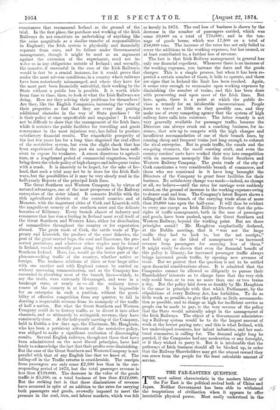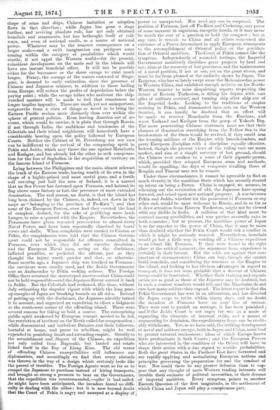THE FAR-EASTERN QUESTION.
rah most salient characteristic in the modern history of the Far East is the political revival both of China and Japan. Neither Government has been able to withstand the temptations of civilisation when it appears to offer- irresistible physical power. Most easily understood in the
shape of arms and ships, Chinese imitation or adoption flows in that direction ; while Japan has gone a stage further, and reviving absolute rule, has not only obtained ironclads and armaments, but has bethought itself of rail- ways, and even of national credit, as a source of national power. Whatever may be the remoter consequences on a larger scale—and a swift imagination can prefigure some coming within the category of possibilities which would startle, if not appal the Western world—for the present, coincident development on the main and in the islands will have one instant beneficial effect. It will not be possible either for the buccaneer or the shore savage to exist much longer. Piracy, the scourge of the waters eastward of Singa- pore, is doomed to early extinction, since the presence of Chinese and Japanese cruisers, in addition to those hailing from Europe, will reduce the profits of depredation below the paying point ; while the savage tribes who maltreat the ship- wrecked mariner will be made to feel that remoteness no longer implies impunity. These are small, yet not unimportant, outgrowths from a state of things so novel as to bring the Eastern Pacific realms more distinctly than ever within the sphere of general politics. Even leaving America out of ac- count, which would be unwise, it is plain that through Russia, if not through India, the ambitions and tendencies of the Celestials and their island neighbours will henceforth have a considerable bearing upon the policy followed by European Courts. Neither the Cabinet of St. Petersburg nor our own can be indifferent to the revival of the conquering spirit in Pekin and Jeddo, which may throw the one against Manchuria and Kasligar, and has already led the other to seek compensa- tion for the loss of Saghalien in the acquisition of territory on the famous Island of Formosa.
Lying between the Philippines and the main, almost athwart the track of the Eastern trade, having wealth of its own in the shape of a highly-prized and most useful gum, and a fertile soil covering just half the area of Ireland, it is a marvel that no Sea Power has fastened upon Formosa, and hoisted its flag above some factory or fort, the precursor of more extended domination. The real reason, no doubt, is that the island has long been claimed by the Chinese, is, indeed, set down in the maps as "belonging to the province of Fo-Kien "; and that none of the European Powers, even had they coveted the land of camphor, desired, for the sake of gratifying mere land- hunger, to raise a quarrel with the Empire. Nevertheless, the Formosans have given repeated provocation to almost every Naval Power, and have been repeatedly chastised by boats' crews and shells. When complaints were carried to Canton or Pekin, the complainants were told that the Chinese Govern- ment could not be responsible for offences committed in Formosa, over which they did not exercise dominion ; and the European Naval men, acting on the disclaimer, inflicted penalties, or pocketed the affront, just as they thought the injury worth powder and shot, or otherwise. Some months ago, a Japanese ship was wrecked on Formosa ; the survivors were cruelly used, and the Jeddo Government sent an Ambassador to Pekin seeking redress. The Foreign Office there returned the stereotyped answer—that China could not be held responsible—and the Japanese Envoy carried it back to Jeddo. But the Celestials had reckoned, this time, without duly estimating the singular vigour with which the long pent- up energies of Japan are breaking bounds on all sides. Instead of putting up with the disclaimer, the Japanese adroitly turned it to account, and organised an expedition to effect a lodgment. at the south-west corner of the offending island. There were several reasons for faking so bold a course. The enterprising public spirit awakened by European contact needed to be fed, the restriction of territory on the North called for compensation ; while discontented and turbulent Dahnios and their followers, harmful at home, and prone to rebellion, might be well expended in punishing insult and extending empire. Greatly to the astonishment and disgust of the Chinese, an expedition not only sailed from Nagasaki, but landed and estab- lished itself in the Bay of Liang Klan. The old terror of offending Chinese susceptibilities still influences our diplomatists, and accordingly we find that every obstacle was thrown in the way of a design which certainly looks like the parent of troubles. The Foreign Agents went so far as to compel the Japanese to purchase instead of hiring transports, and brought so strong a pressure to bear on the Government, that the expedition was countermanded,--after it had sailed. As might have been anticipated, the invaders found no diffi- culty in dealing with the tribes ; but it is now beyond doubt that the Court of Pekin is angry and annoyed at a display of
power so unexpected. Nor need any one be surprised. The position of Formosa, just off Fo-Kien and Chekeang, may prove of some moment in sagacious, energetic hands, or it may never be worth the cost of a garrison to hold the conquest ; but at any rate, it reveals to China and all others concerned the existence of a Power determined to apply European armaments to the accomplishment of Oriental policy or the gratifica- tion of Oriental ambition. The Court of Pekin cannot like the symptom. Independently of wounded feelings, the Imperial Government manifestly cherishes great projects by Land and sea ; aims at the recovery of lost provinces, and the maintenance of a naval position, if not at sea, yet on the great rivers, and must be far from pleased at the audacity shown by Japan. The Emperor, who has so lately swept away the Mohammedan power in Western China, and exhibited enough activity on his North- Western frontier to raise disquieting reports respecting the future of Eastern Turkestan, is filling his depOts with vast piles of military materiel, and turning ship after ship out of the Imperial docks. Looking to the traditions of empire reviving in Pekin, and transmuted into acts on the Western frontier, it can hardly be doubted that an effort will be made to recover Manchuria from the Russians, and wrest Yarkand and Kashgar from the grasp of Yakoob Beg. The more penetrating Chinese statesmen must see that their chances of domination stretching from the Yellow Sea to the head-waters of the Oxus would be revived, if they could arm the teeming millions of the Empire with breech-loaders, and parry European discipline with a discipline equally effective. Indeed, though the present views of the ruling race are more modest, and aim at a simple recovery of lost ground, should the Chinese ever awaken to a sense of their gigantic power, which, provided they adopted European arms and methods, would be appalling, the days of conquests rivalling those of Zenghis and Timour may not be remote.
Under these circumstances, it cannot be agreeable to find so much vivacity in the maritime State which has recently started up intent on being a Power. China is engaged, we assume, in scheming out the restoration of old, the Japanese have sprung forward, and seized upon new national property. A war between Pekin and Jeddo, whether for the possession of Formosa or any other end, would be most welcome to Russia, and in so far as it drew attention from Eastern Turkestan, might not be viewed with any dislike in India. A collision of that kind must be counted among possibilities, and war parties assuredly exist in both countries ; but at present, the maritime power of Japan is so far superior to the power of China, that it may be more than doubted whether the Pekin Court would risk a conflict in which it might be seriously worsted. ,Nevertheless, ironclads would go but a little way in warding off a Chinese expedition to an island like Formosa. If they were found in the right place at the critical moment, the argument from experience is certainly in their favour. But the odds are against that con- juncture of circumstances; China can buy, though she cannot build ironclads, and considering the nearness of the Empire to the island, and looking to her obvious advantages in regard to transport, it does not seem probable that a descent of Chinese troops could be frustrated. Whether their training and organi- sation are as good as those, of the Japanese may be doubted, but in such a contest numbers would tell, and the -Mandarins do not care how many soldiers they expend. The latest report is that the Pekin Government has sent in an ultimatum, and has directed the Japan corps to retire within ninety days, and no doubt the invaders of Formosa have an easy line of retreat. They were sent to punish an outrage, it has been punished ; and if-the Jeddo Court is not eager for war as a mode of expending the elements of internal strife, and a means of augmenting its dominion, the expeditionary force can be credit- ably withdrawn. Yet, as we have said, the striking development of naval and-military energy, both in Japan and China, must lead to greater external restlessness ; ideas of which Europe knows little predominate in both Courts ; and the European Powers who are interested in the condition of the Orient will have to shape their action with a due regard to warlike probabilities. Both the great States in the Farthest East have borrowed and are rapidly applying and assimilating European notions and principles governing the preparation for and the conduet of war. Nor could there be any greater delusion than to sup- pose that any thought of mere Western trading interests will trouble their estimate of political necessities, or their dreams of imperial ambition. Every symptom points to another Eastern Question of the first magnitude, in the settlement of which China and Japan will play a conspicuous part.































 Previous page
Previous page